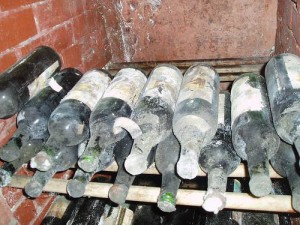I’ve been suffering a bit of writers block of late. Couple that with a busy work schedule, the NBA finals, and a desire for some serious changes to the site (blog) and you get almost 2 weeks of inactivity. SORRY….
But I was inspired by something I read before the weekend. I was reading Robin Garr’s 30 second Wine Advisor & his most recent piece about aged wines; “Older of Better“.
The piece talks a bit about how wines change as they age, with some improving (though I think that is subjective). He also mentioned that most wines are meant to be consumed young. And I would tend to agree, that most wine is in fact made with the intention that it be consumed within a few years of release.
I know people who prefer young wine to old wine. Young wines have firm tannins and big fruit. Whereas older wines can be more acidic and absent of fruit.
Prior to writing tonight’s post, I tasted two older wines over the weekend. Neither were of the 20+ years old category, generally reserved for top wines. But both were from the 2000 vintage and neither was a reserve wine of sorts – so safe to assume it was not meant for long term aging.
The first, a Merlot from Israel, showed a remarkably youthful color. Sadly it was corked – no pleasure to be derived here.
The second was a simple Bourgogne. Whereas 1er Cru or Grand Cru Burgundy can age for MANY years, the more simple Bourgogne is one of those “intended for early consumption” wines. So the 2000 being alive was in my mind a long shot. Popped the cork for Dad and others this afternoon and sure enough it was BROWN – a sure sign that the wine is dead…right? Well, it had some oxidative qualities, but a remarkably fresh acidity and some secondary characteristics of dried fruit, leather & mushrooms. What can I say, I loved it!
This wine might not be for everyone. But the funky secondary characteristics are one of the most exciting things about aged wines. Drinking a young wine is like checking out the babies in a maternity ward. Sure they all look a bit different, but when it comes down to it, unless it is your baby they are just a bunch of diapered newborns. Give that newborn 5, 10 even 20 years to age and now you’ve got character.
The “how to properly age wine” conversation is a completely different topic (which I think I’ve previously covered), but if you have an open mind to wines that are not fruit forward, and you have the opportunity to try an aged wine, or at least put one away for several years, try it. You may have an aged wine epiphany!
Happy aged wine tasting!
WTG
Tags: aged wine

Warning: Declaration of Social_Walker_Comment::start_lvl(&$output, $depth, $args) should be compatible with Walker_Comment::start_lvl(&$output, $depth = 0, $args = Array) in /home/u640618151/domains/winetastingguy.com/public_html/wp-content/plugins/social/lib/social/walker/comment.php on line 18
Warning: Declaration of Social_Walker_Comment::end_lvl(&$output, $depth, $args) should be compatible with Walker_Comment::end_lvl(&$output, $depth = 0, $args = Array) in /home/u640618151/domains/winetastingguy.com/public_html/wp-content/plugins/social/lib/social/walker/comment.php on line 42
[…] Continue reading here: Resilient wine | Wine Tasting Guy […]
Nice read. Thanks for sharing your informative write up. Looking forward to reading updates of your post.